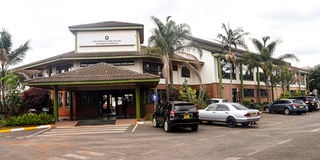Lawyer seeks to break Kenya School of Law monopoly

The Kenya School of Law academics complex in Nairobi.
What you need to know:
- To be admitted to the roll of advocates in Kenya, one must undertake the ATP, a postgraduate diploma in law that is only offered by the KSL.
- Mr Njoroge argues that the Council for Legal Education (CLE), which regulates law courses in Kenya, has refused to pick up from a 2017 task force formed by then-Attorney General Githu Muigai, which recommended that the ATP be offered by accredited universities.
The monopoly of the Kenya School of Law in offering the diploma mandatory for individuals seeking to be admitted to the roll of advocates could end if a fresh petition filed in court succeeds.
Lawyer Francis Karanja Njoroge says in his petition before the High Court that the Kenya School of Law (KSL) is overwhelmed and cannot cater for the over 3,000 students undertaking the Advocates Training Programme (ATP).
To be admitted to the roll of advocates in Kenya, one must undertake the ATP, a postgraduate diploma in law that is only offered by the KSL.
Mr Njoroge argues that the Council for Legal Education (CLE), which regulates law courses in Kenya, has refused to pick up from a 2017 task force formed by then-Attorney General Githu Muigai, which recommended that the ATP be offered by accredited universities. Prof Muigai formed the task force in a bid to find a way to improve the quality of education at the school.
The petitioner has asked the High Court to declare section 16 of the KSL Act null and void. The section states that no individual shall be admitted to the KSL unless they have met the school’s requirements.
Mr Njoroge argues that this unlawfully gives the KSL power to make regulations for the admission of persons to legal programmes, which is the exclusive mandate of the CLE.
“While the Council of Legal Education has established an elaborate framework to accredit and license legal education providers at other levels of legal training, it is curious that it has, despite the apparent shortcomings thereof, allowed the Kenya School of Law a monopoly status,” Mr Njoroge says.
“The Council of Legal Education has failed to issue or develop the regulatory framework and standards for licensing other legal education providers (in addition to the Kenya School of Law) to offer a postgraduate diploma (Advocates Training Programme). I verily believe that this constitutes a breach of its obligation to set and enforce standards relating to the accreditation of legal education providers for licensing under section 8(2)(a) of the Legal Education Act, 2012,” Mr Njoroge s in his petition.
None of the respondents in the suit – the Ministry of Education, the Attorney-General, CLE – has responded to the suit. The KSL, which is listed as an interested party, is yet to file a response to the case.
Mr Njoroge adds that the quality of education at the KSL has dropped owing to its strained resources which cannot cater for the thousands of aspiring lawyers.
His petition also raised concern about the high number of failures in the ATP, which has caused financial stress to several students who have to pay for a re-sit of the final examinations.
For several years, more than half of the students sitting the bar exams have failed. In 2018 only 18 per cent of the students that sat the exam passed. A year later, 36 per cent passed.
Rapando & Odunga Advocates, which is representing Mr Njoroge, holds that the CLE is also discriminating against other institutions offering law courses by failing to allow them to have the ATP.
The CLE and KSL in 2019 denied claims that students were being deliberately failed so as to milk more money from aspiring lawyers.
The KSL said it had contracted an independent firm to audit the pass rate, but the report has not been made public. The Senate also investigated the mass failures in 2020, but its report has also not been made public.





